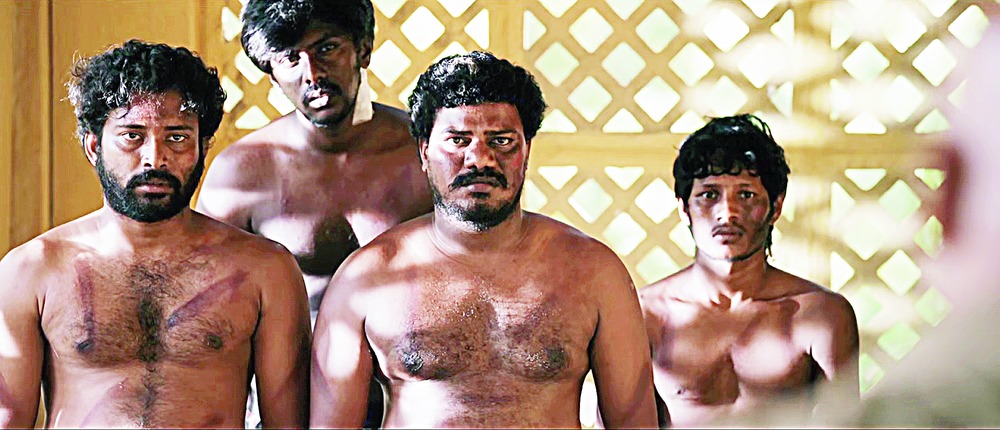
He had wanted to throw a burning tyre on the policeman who had tortured him in custody. Run him over. Inflict on him the same intense pain he had felt when he was flogged relentlessly in the confines of a dark cell. But M. Chandrakumar did none of these things. Instead, he wrote a book.
Lock Up details his experience of blood-curdling police brutality as a teenager. The book is the basis of the Tamil film Visaranai (meaning interrogation), India's official submission to the 2017 Oscars in the best foreign film category.
"It [writing the book] was a way of exorcising the pain that continued to haunt me for many years," Chandrakumar tells me.
Chandrakumar is an auto driver, about 50, with a longish white beard and a sage-like visage. He is prodigiously well read. Henri Charriere, Dostoyevsky, Vaikom Basheer, the Tamil epics Silapathikaram, Sundara Kattam... The names roll off his tongue with an ease that can only come from long years of intimacy. But he claims that as a child he would devour the Phantoms and Tarzans and Mayawis (a Tamil adventure hero with an iron hand). His grandfather, his real-life superhero, would ask little Chandrakumar to read out to him. "He would say Saraswati resides on the tip of my tongue."
But poverty interrupted. Chandrakumar or Auto Chandran's education was cut short in Class X. Chandrakumar eventually ran away from his Coimbatore home when still a teenager and started making a living doing odd jobs in neighbouring Andhra Pradesh. It was then that he and his friends were picked up by cops, "without provocation". They spent 13 days of hell in police custody and a couple of months in jail before the court released them. The book, written in 2006, is based on this horrifying episode.

Vetrimaaran, director of Visaranai, loved Lock Up. "Here's a man who survives hardship, comes out of it with so much positivity and becomes a human rights activist. I found it endearing."
The film is graphic. It shows what happens to the boys through tight, dimly-lit frames. Chandrakumar recounts, "They stripped us. Kept beating us all over, leaving deep welts on our bodies. They would circle us. At some point, a police officer would tell us the beating would stop if we confessed to stealing the tape recorder. We were bewildered. Why admit to something we never did? Then another cop would come and start beating us all over again."
Eventually, it dawned on Chandrakumar and the others that they were being framed. There had been a major robbery in the area and the cops were pinning the blame on them. Two of his friends admitted to the crime they never committed, just to end the absurd misery. They were taken to the crime spot and forced to enact the robbery.
Vetrimaaran recalls that the most challenging part of making the movie was the physical violence. "Though, we did not use real sticks the actors still had to be beaten. At one point actor Dinesh's [Ravi] skin peeled off," says the director, who shot to fame with his National Award-winning film Aadukalam, a Dhanush-starrer, based on a town involved in cock-fighting. Dhanush has produced Visaranai.
The first half of the film focuses on illegal confinement. The second half revolves around the death of a high-profile chartered accountant who dies during interrogation. He has links with powerful politicians. His body is subsequently taken by the police and "hanged" in his home to make it look like a suicide. Chandrakumar's four protagonists are unwittingly drawn into this murder.
Visaranai is a stark, hard-hitting film that makes one weary of the "system". A few, however, might find the violence and the howling unpalatable and over-the-top.
Vetrimaaran has a counter to that: "Filmmakers are like historians, they are representing society and cannot afford to distort history. I like to make films close to real life, so someone watching them decades later will know what life was like. I have not glorified violence in my life, it is a film against violence and human rights violations."
But Chandrakumar admits that people won't sleep after watching the film or reading the book.
Chandrakumar still drives an auto in Coimbatore. He says matter-of-factly, "I got Rs 2 lakh for the movie. The six books I wrote and published myself don't make money. I need to earn a living."
Visaranai premiered at the International Film Festival held in Venice last year. Chandrakumar also attended it. After the film screening, he says, viewers came over and hugged him, clicked selfies with him, held his hand and said, "Sorry, we are deeply sorry about what happened to you."
Is he still angry? "The day the police treat people with respect that day all the anger inside me will die down," says Saraswati's chosen one.
From his lips to God's ears.










